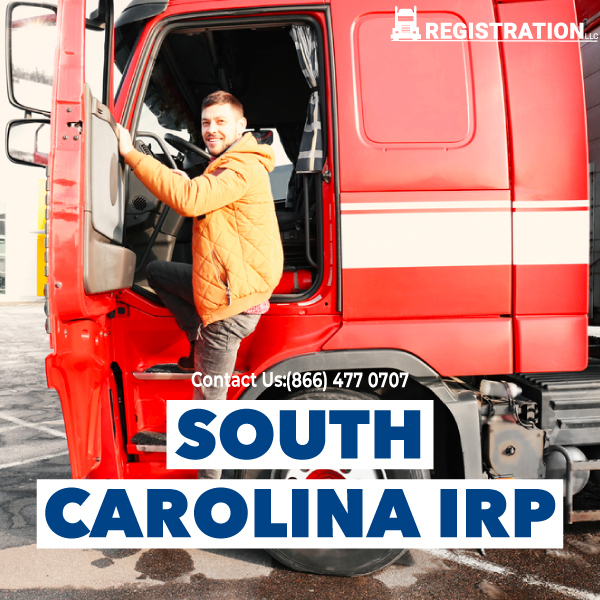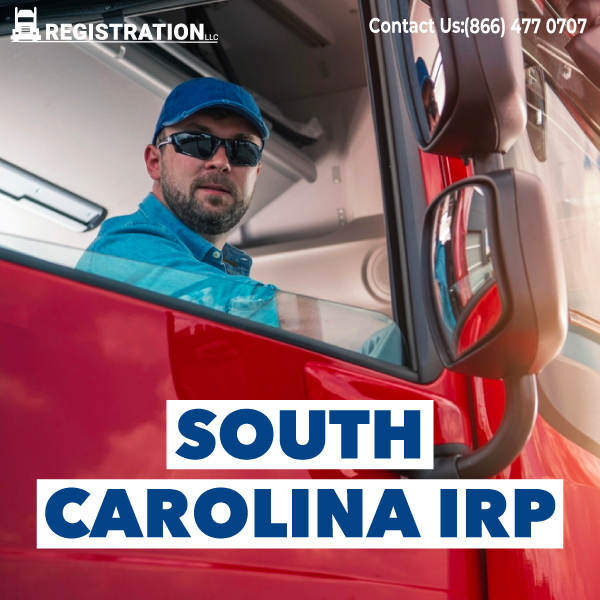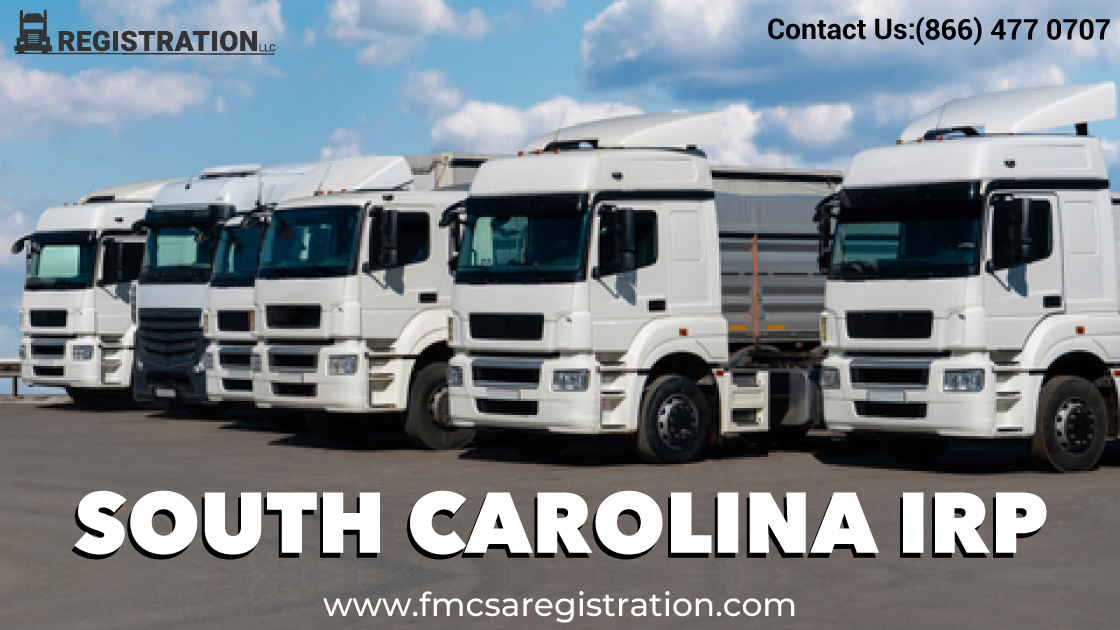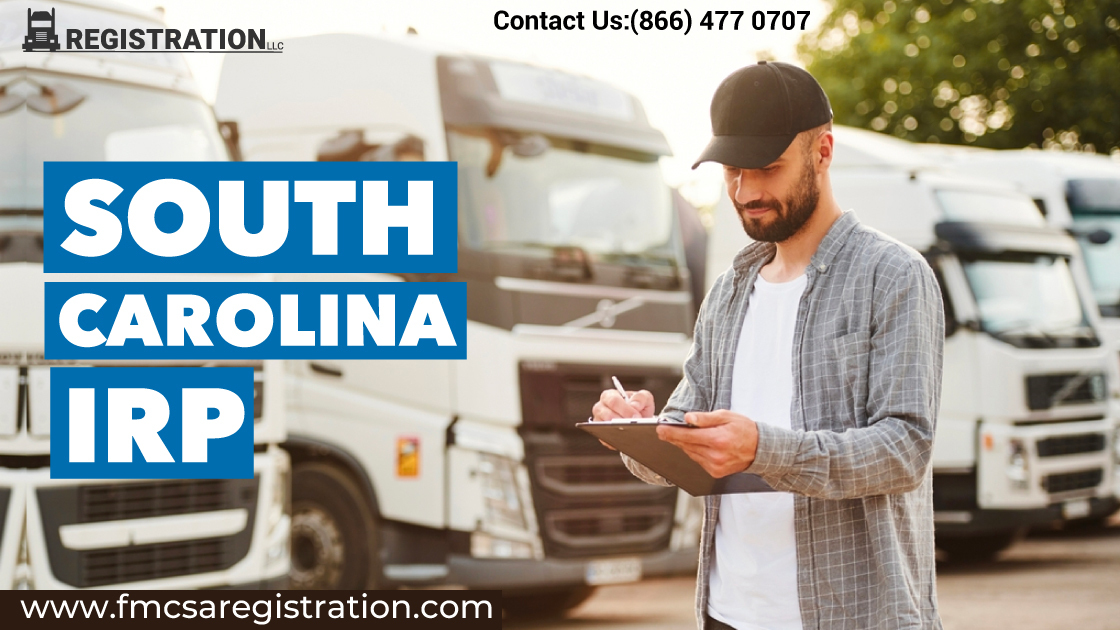South Carolina IRP
$618.00 Only
$618.00$618.00 Only
Product Code: 359
Product Description:
Simplifies commercial vehicle registration across jurisdictions, ensuring regulatory compliance and operational efficiency.
Streamlines commercial vehicle registration, ensuring compliance and operational efficiency across multiple jurisdictions.
Simplifying commercial vehicle registration for regulatory compliance and efficient multi-jurisdictional operations
Efficiently manages commercial vehicle registration for regulatory compliance and operational effectiveness.

Introduction to South Carolina IRP
In the busy transportation trucking world, mastering regulations can be just as critical as plying roads. The International Registration Plan (IRP) in South Carolina DOT Number offers a method for truck drivers and transport companies to register their fleet of vehicles in several different states at one time. This part is intended to narrow that knowledge gap, and bring IRP that bit more into the line of vision for those steering wheels vital industry.

The Importance of Apportioned Plates for Business Customers
Apportioned plates go more than metal tags on the back of your vehicle, they symbols the commitment of a business to procedure and mobility. Here's why they matter:
- Simplified Registration: Forget juggling multiple state registrations. Apportioned plates provide an identical solution, allowing your fleet to remain legal across state borders.
- Cost-Efficiency: Through the IRP, fees are assessed according to miles per mile traveled in each state. This ensures you pay only your share.
- Time-Saving: With apportioned plates, the paperwork shrinks, allowing you to spend more time behind the wheel and less time at the DMV.

Mastering the IRP: Streamlining Registration for Efficient Fleet Operations
At first glance, navigating the IRP process may seem daunting. But the first step toward smoother sailing is understanding the benefits of this process for your enterprise. Whether you are a long-time transporter or just jumping into the trucking industry, recognizing the value of apportioned plates can make a big difference to your operational efficiency and legal compliance.
For a smooth experience handling IRP registration for your fleet and getting your vehicles on the road without problems, turn to FMCSA Registration. Our website, fmcsaregistration.com, takes the complexities of the IRP and presents them in simple terms for you to run through step by step. So if you want your trip from compliance to efficiency in business to be more manageable than difficult, take advantage of our services and put an end to worries.
The journey of IRP registration is a new voyage toward operational excellence. As we sail this course together, remember: the goal is not only to follow rules, but thrive. Equipped with the right knowledge and resources, the road ahead is an opportunity not merely a route.

A Step-by-Step Guide to Registering New Accounts with detal
Drop Into the International Registration Plan (IRP) takes you to South Carolina's page for an initial how-does. But breaking this elaborately involved course of action down into bite-sized pieces transforms what might be called an impossible task into one that can be done! Here is an easy friendly guide to help you get going on your IRP account setup:
- Organize all your business information: Start with the very basics... company name, phone number and FEIN (Federal Employer Identification Number). This first step will guarantee that when you register, your identity matches that of your business.
- Note your vehicles: List all vehicles requiring apportioned registration. Including make, model, VIN and year series. This is the step that decides whether your fleet is eligible for geographic scope or anything else.
- Work out your miles: Get an idea of the miles traveled in each jurisdiction within the year just past. Accurate mileage accounting is a critical factor in calculating apportionments.
- Access fmcsaregistration.com: Navigate the IRP accounts setup on our one-stop website for total confidence. We operate to streamline all regulatory compliance, making your registration process go as easily as it can.

Customer Reviews
Great Services!
FMCSA Registration LLC has been a life-saver for my company. They ensure that my employees comply with all FMCSA regulations. We haven’t been fined or penalized in many years. And I owe that to the great folks at FMCSA Registration LLC. They are the only third-party registration service that I trust.
My organization has been securing DOT Numbers, MC Numbers, UCR Registration, and all other FMCSA requirements from FMCSA Registration LLC for well over a decade. Why? Their services are lightning-fast, their customer service is excellent, and they go the extra mile to make sure that we maintain full compliance at all times. A+++.
What Kind of Documents and Information Does IRP Application Need?
In order to make registration smoother, it is really important that your documents are prepared in advance. What you'll need is as follows:
- Proof of Business Establishment: Articles of incorporation, business licenses, and other legal papers to verify that the business exists and is legit.
- Vehicle Information: Titles or leases on each vehicle, plus evidence of insurance mean that every truck you own is covered and on the books.
- Mileage Records: Accurate charging and assignment depend on detailed logs of both intrastate and interstate travel.
By preparing and submitting the necessary documentation and information in an organized manner, you are building a solid foundation for your IRP account. You are not only complying with the requirements put forth but also facilitating your cross-regional business operations. For IRP Registration to Succeed:
Remember that every successful journey starts from a single step. It is an investment in the future of your business to take on the new task of setting up an IRP account. And with fmcsaregistration.com support, coping with the complexities of IRP registration becomes not only easy but also a step that strategically positions your company for both operational excellence and compliance.
How Energy Policies Affect IRP Participants in South Carolina
Integrated Resource Plans: How They Affect Transportation Matters
In South Carolina, swooping energy policies pollute the logistics of transportation In the end, this shapes the future of trucking and logistics. Integrated Resource plans (IRPs) are a blueprint for a sustainable energy future, and their impact on the transportation sector can also be described as far-reaching and versatile.
We will now interpret these policies: how do they cause the industry to aim at efficiency without damaging the environment? Through the combination of renewable energy sources and fuel optimization, IRPs indirectly serve to encourage businesses with fleets to improve their energy efficiency. The result is a reduction in overall carbon footprints and a cleaner ecosystem. Here’s how:
Fuel Efficiency: Measures to improve fuel efficiency are not only following environmental objectives but also lowering transportation companies’ operating expenses.
Renewable Energy: Solar and wind developments, motivated by IRPs, are beginning to enter the transportation industry in a big way. They are powering barns, orchards and charging stations for electric vehicles.
In view of Carolinas plan for resource utilization and the major energy providers within her borders, South Carolina IRP stakeholders might learn some lessons. This can be seen by the initiatives of major energy providers such as Duke Energy and Santee Cooper that spread throughout all aspects of life and underscore the importance of sustainability and efficiency in powering tomorrow’s transportation.
Duke Energy's large-scale investments in renewable energy generators are changing the way all transportation companies think about the power they use and how sustainable it is. As they aim to meet a goal of cutting carbon emissions by turning instead to solar and wind power, some tempting opportunities present themselves for South Carolina IRP stakeholders to alter working habits and adopt cleaner technologies.
Santee Cooper's Renewable Energy Initiatives The company’s push to add renewable resources to its power mix is also a visible sign of a shift towards sustainability. For IRP stakeholders, a range of opportunities arise from this shift—a chance to use renewable power sources in operations that are both cost-effective and take the environment into their but into account, too.
As transportation companies in South Carolina look ahead at the ever-evolving landscape, they can take heart from the Carolina hanging value of the knowledge of any undoing and substantial efforts on the part of energy providers. To meet energy-saving targets is not just a matter of regulation-compliance; it means steering our industry themselves towards a sustainable future.
Key Insights From Energy Suppliers
Duke Energy and Santee Cooper integrated resource plans overview
When searching deep into South Carolina's energy picture, two beasts stand out: Duke Energy and Santee Cooper. Their Integrated Resource Plans (IRPs) aren't just a blueprint for their own future operations; they are also a signal to the transport industries about what they should expect in the way of the road ahead.
Duke Energy’s Vision
Duke Energy is blazing a trail through the energy jungle with machetes of innovation and sustainability. Solar and wind power are now taking prominence in their IRP, setting a standard not just for energy consumption but also pointing toward how the transport industry can evolve in the future. Their commitment to solar and wind power isn’t just about keeping the lights on; it’s about driving a future in which transport can take on electric vehicles (EVs), slashing its carbon footprint
Santee Cooper's Strategy
Santee Cooper is not far behind, with a commitment to sustainability and efficiency that is showing through its IRP. The emphasis on renewable energy and modern infrastructure conversely complements the transport industry: is this a signal that in the future, logistics operations should expect power sources more reliable than diesel generators and power costs quite considerably less than now?
How Energy Plans Shape the Transportation and Trucking Industry
There are essentially two ways that these Integrated Resource Plans affect transport with heavy investment in trucking:
Economic Impacts Should renewable energy featuring into more assets slowly become cheaper to utilize, the cost of fueling a transportation fleet also may undergo some substantial change. It might well prove a game changer for the companies now contending with today's high fuel costs.
Sustainability Goals In a global push towards greener logistics, the use of EVs for fleet operations is no longer so much a 'if' and begins to become more of a 'when'. Duke Energy’s goals and similar plans from Santee Cooper, South Carolina push further in this direction, offering a preview of how logistics might look if transportation not only controls but also contributes positively to our world. It's as if you could be a captain and sink underneath water at the same time.
The upshot is that energy plans formulated by these suppliers not only determine how South Carolina will power its future but are also clearly influencing the transportation and trucking industry toward a sustainable, efficient, prosperous tomorrow. Managing these developments is not only good practice for firms in this sector, however; it's also absolutely crucial to being able to take advantage of the opportunities and avert the obstacles that lie ahead.
In the direction of environmental trends, carriers can improve operating efficiencies and also find themselves in the forefront of an inevitable green revolution that is reshaping their industry. With FMCSA Registration as a partner, businesses can be legally compliant, achieve efficiency, and move toward a greener future. Visit fmcsaregistration.com for more detailed information on the requirements of specific areas in the transportation industry.
A Detailed Guide to South Carolina IRP & IFTASecuring the International Registration Plan (IRP) and International Fuel Tax Agreement (IFTA) credentials in South Carolina may appear intimidating to behold at first. With the right information and preparation, however, professional transportation drivers, company owners, and truckers can handle the requirements and procedures effectively.
This guide is to offer a clear, informative overview of South Carolina's IRP & IFTA requirements and how to obtain next-day trip and fuel permits conveniently.
Understanding South Carolina IRP & IFTA RequirementsThe South Carolina Department of Motor Vehicles (SCDMV) is the agency that carries out the IRP and IFTA. It makes way for commercial vehicles to cross state lines and to travel in Canada on a single license, whilst at the same time distributing fees fairly based on road mileage.
IRP Requirements:Eligibility: Applies to commercial vehicles over 26,000 pounds or with three or more axles crossing state lines. Documentation: Including Things like proof of business, vehicle registration, insurance and operational records.
IFTA Requirements:
Tailored to commercial vehicles that consume fuel while operating interstate.
Necessitates quarterly fuel usage reporting and adheres to specific tax rates per gallon in each jurisdiction.
The Process of Obtaining Instant Trip and Fuel Permits
For commercial vehicles that need immediate authorization or for those not registered under IRP or IFTA, South Carolina offers instant trip and fuel permits. These permits enable temporary operation allowing businesses to meet urgent logistical demands without delay.
Obtaining Instant Permits:
- Application: Accessible through the South Carolina Trucking Permits, LLC, or similar service providers, the application for instant permits can typically be completed online.
- Documentation: Require basic vehicle information, including weight, axles, and operational scope.
- Fee Payment: Costs vary based on permit type, with detailed pricing available on the provider's website.
Benefits of Instant Permits:
- Flexibility: Empower businesses to take on immediate transportation opportunities.
- Compliance: Ensure legal operation across state lines in the absence of IRP or IFTA.
- Convenience: Fast processing means permits can often be obtained on the same day.
Navigating the intricacies of IRP and IFTA in South Carolina doesn't have to be complex. By understanding the requirements and leveraging the availability of instant permits, transportation professionals can ensure compliance and operational readiness. For additional guidance or to explore tailored solutions for navigating IRP and IFTA registration processes, consider reaching out to FMCSA Registration. Visit fmcsaregistration.com for comprehensive support designed to streamline your registration journey in South Carolina, ensuring your business can hit the road with confidence and compliance. registration journey in South Carolina, ensuring your business can hit the road with confidence and compliance.
Plowing Through IRP Registration And Renewal
Living through the International Registration Plan (IRP) registration and renewal process in South Carolina means mastering it from start to finish. This section sets out practical tips to use for outlet comcar drivers alike-although, thanks to readers like both this production transport one and next week's truck driver just entering upon his life who needs its informative guidance with equal urgency indeed!
Complete your registration process
Obtain the necessary documentation: Start by collecting the required documents, including your business license, titles or lease agreements for each vehicle, insurance coverage certificates, and detailed distance records of all trips made by any vehicle.
Go to the South Carolina DMV Portal: With the state's online services for the Motor Carrier Authority, you can start your registration. South Carolina has the digital space; it makes administration simpler for business customers.
Submit Your Application: Once your application form is complete and you have attached the necessary documents to it, simply submit through the portal. Check for correctness and completeness to avoid unnecessary delays in handling times.
Renewal Process:
- Review Your Current IRP Details: Closely examine the mileage and vehicle information on your account to determine any changes or updates needed.
- Update Information as Needed: Make any necessary amendments to vehicle data or operational distances that reflect your most recent year of operation.
- Submit Your Renewal Application on Time: Timeliness is crucial in ensuring no lapse in your IRP registrations, so keep track of renewal deadlines and submit your application well in advance.
Overcoming Common Challenges in IRP Compliance
Navigating System Timeouts: Many operators face session timeouts when applying or renewing online. To prevent loss of data, regularly save your progress and keep essential information backed up for easy access.
Document Discrepancies: Discrepancies in documents can delay the IRP process. Ensure all documents are current and accurately reflect your operation’s details. Utilize checklists provided by the South Carolina DMV to verify you've got everything covered.
Meeting Renewal Deadlines: Missed deadlines are a common issue. Setting up reminders well before the actual renewal dates can help avoid last-minute rushes and potential penalties.
The South Carolina Department of Motor Vehicles (DMV) provides robust support and resources for navigating the IRP system, including detailed guides and contact information for direct assistance.
South Carolina Department of Motor Vehicles, known as SCDMV, provides rich support and resources to help you navigate the IRP system. These include detailed guides for newcomers that take five minutes off your learning curve (all freely available) and contact information about where questions can be asked directly. Experts carry out easy annual renewal operations on behalf of clients but give them the professional help they need in managing their IRP registrations and renewals. Using fmcsaregistration.com products allows you to economically adapt to suit your individual requirements as a business rather than being without support at all when trying hard on your own.
Adding Value to Your Enterprise: The Benefits of South Carolina IRP
In South Carolina's rapidly expanding and ever-prosperous transportation industry, efficient interstate operations are the key to future corporate growth. As a cornerstone of the International Registration Plan (IRP), this blueprint offers a complete model for its business partner counterparts; in vain, any company without such support will find themselves following suit rapidly no matter how fine their work ethic. Get to grips with South Carolina IRP, and transport companies can utilize it as an array of strengths, guide their business transformation to stave off waste, and achieve efficiency.
Well-Positioned for Growth: Leveraging South Carolina IRP
IRP opens up opportunities for commercial vehicle operators to carry on their business beyond the borders of its home state. Here is a guide on how to make it work:
- Effortless Interstate Operations: With IRP, it is possible for companies to now operate inside member jurisdictions, which include American states and Canadian provinces. No longer will each individual territory need a separate permit.
- Streamlined Administrative Certification: Establishing regulation details for a vehicle then all into one plan, can be a great benefit for enterprises with heavy machinery. Without IRP, one would have to do lots of manual work and invest a month or even years with their back-facing clerks before these applications were complete.
- Flexibility And Scalability: As its business expands, more vehicles can be added to a company’s irp and the operational areas increase. South Carolina state IRP allows one to follow logistical suggestions in a more easy way, allowing them to grow as quickly and naturally out of all proportion towards their own goals, Whether politically, socially, economically, or environmentally.
Key Advantages and Benefits of Complying with IRP
There are several key benefits that come from following the IRP. All of these directly add to transportation companies' operational success and compliance: Cheap Operations: In each jurisdiction, businesses pay apportioned fees congruent with the actual distance that they travel instead of paying for what they actually drive through, which lets companies be 100% sure of proper accounting and budgeting.
- Enhanced Compliance: Staying within IRP regulations ensures businesses avoid being hit with costs for legal violations it will also establish credibility and reliance on the market.
- Business Continuity: By meeting the IRP's requirements, companies are allowed to keep doing business, and not miss time themselves by away from work on other issues such as registering or permits.
By developing a thorough understanding of South Carolina IRP and IFTA requirements, as well as handling the processes of securing instant trip and fuel permits, businesses can satisfy their legal obligations while at the same time obtaining a competitive edge in the marketplace. With the South Carolina IRP, the strategic application is more than just compliance; it's also an engine of corporate growth and operational excellence # as well as testimony to a company's commitment to conducting business effectively and lawfully.
For business owners who want to maximize the full value of their transportation companies, accepting all benefits offered by South Carolina IRP means taking a future that is prosperous and sustainable in this industry as a given.
For further information on how to navigate the South Carolina IRP registration and renewal procedures, enlist the services of veterans such as FMCSA Registration. Your source for help is fmcsaregistration.com which specializes in getting your mirrors right for easy driving through the IRP jungle.
In essence, the convergence of IRPs and the South Carolina transportation sector is a journey into innovation, efficiency and sustainability. In the hands of IRP participants, this merging of energy policies points toward a greener tomorrow and speedier arrival at your local goals.
A Guide to Understanding Apportioned Plates and IRP Registration
Initially, the world of International Registration Plan (IRP) and International Fuel Tax Agreement (IFTA) in South Carolina may seem complicated. Yet with a simple approach, the truck driver can make these systems work for them to substantially benefit their business. This guide aims to clear up apportioned plates and IRP registration while establishing what IFTA represents.
Deciphering Apportioned Plates: Importance and Practices
Apportioned plates are vital for anyone in the trucking industry who does interstate or international business. Why is this so important? Here are the reasons:
- Recognition: Apportioned plates are recognized everywhere that falls under IRP, which eliminates the need for multiple state registrations.
- Mathematics: Based on the mileage traveled in each state, the supported plates enable commercial vehicle operators to spread registration costs over this time period. This makes road usage charges and vehicle size differences less significant with little or no concern whatsoever about taxes applied unfairly to long-distance trucks that use relatively small amounts of public services yet impose greater costs on society as a whole than do smaller vehicles operating closer to home towns where many people live and work--they are being supported from personal income earned locally due largely to the labor markets now found in inner cities that have emerged since World War 2.
- Quill Is Your Friend: Streamlines the paperwork and administrative chores carried out by drivers, since they only have one registration to maintain for their entire fleet.
To obtain apportioned plates in South Carolina, registrants need to sign up under IRP, providing detailed information about their vehicles, proof of business existence, and fleet operations distance records.
Early Bridging IFTA and IRP: A Simplified Explanation Although they perform different functions, IRP and IFTA interact with each other as a system that operates nationally for commercial transportation. IRP Simplifies Vehicle Registration: It lets commercial vehicles be registered in one state but operate legally and proportionally based on the number of miles driven in each jurisdiction.
IFTA Manages Fuel Taxes: It makes via fuel taxes. Separating reports and paying taxes in every state where a fleet operates are phrases that have lost their resonance. Instead, the base jurisdiction pays to collect funds and allocates accordingly. For a commercial carrier, knowing this interplay between IRP and IFTA is crucial. It is not just a matter of obeying rules; it’s about using national systems that have been set up to make commerce between states smooth and cost-effective. South Carolina Uses IRP and IFTA to Drive Enhanced Operations Plan Ahead Proper planning with accurate records is essential. Utilize mileage and fuel consumption tracking tools to simplify reporting. Stay Informed Rules can change.
Always consult the regulations of both IRP and IFTA through inquiries to South Carolina's Department of Motor Vehicles (DMV) and other well-known sources. Seek Expertise If you’re not sure, it’s best to consult someone qualified in IRP management. In need of professionally managed IFTA solutions, services like FMCSA Registration can help your enterprise greatly further its operations while making sure that compliance is maintained and benefits optimized to the fullest extent possible.
in the end, understanding how to properly manage registration in IRP and IFTA is foundational to unlocking the maximum potential of your commercial transport operations in South Carolina.
By making appropriate use of these systems, businesses can ensure compliance, optimize costs and concentrate more keenly on their core services. For those who need specialized assistance, agreements with service providers such as FMCSA Registration Service can smoothen the path to compliance and operational excellence.
Go to fmcsaregistration.com for more details on how to remotely integrate your IRP and IFTA straight into your corporate strategy!
Conclusion: Why South Carolina's IRP Is Still So Important Now
To sum up the full content of our report on South Carolina's International Registration Plan (IRP), it is necessary to review carefully and analyze the importance of IRP for the entire transportation industry of the state. Scheduled for professional transportation drivers, proprietors of transportation companies and truck drivers, this overview seeks to be not only a practical handbook but above all a reminder of how IRP compliance can lead to smoother development and higher profits for business in Palmetto State.IRP: Keystone for Inter-State Commerce South Carolina's IRP is nothing less than the keystone for interstate and international commerce.
It's not just a matter of meeting a legal requirement; it's about taking on board one's institutional arrangement - processes and systems designed to improve service efficiency, cut operating costs, and bring about more even distribution of taxes on the basis where they are earned rather than accumulated into an area with high traffic density across state lines.
Thus, by making it easier for businesses to operate beyond state boundaries, and by actively supporting this trend, IRP is indeed creating a form of growth that is not loaded down with endless administrative burdens but rather flows smoothly into a system that recognizes the true nature on interstate traffic -- by proportioning each party's actual roadside contribution to cumulative travel distances in all jurisdictions.
Taking care of compliance with the IRP is a chance for businesses to demonstrate their commitment to fair play: by this means they ensure that their operations are both legally in order and make a proper contribution to the infrastructure on which they depend. This commitment on the part of businesses positions them favorably in competitive terms as credible and trustworthy partners for clients, regulators, and the community alike.
Leverage People and Accept Sincere Learning
While the process for registering and renewing your IRP can be difficult, South Carolina has many different resources and means of support available to help meet these challenges. South Carolina doesn't leave transport businesses on their own.
They offer clarity and convenience, with the material in print via both IRP & IFTA guides plus online portals like the fuel and trip permits site (home to many more easy-to-use facilities) emphasizing their helpful nature above all else--no wonder that innovative take on support is there dedicated for life! Besides, companies like FMCSA Registration offer customized services.
They help businesses not only comply with regulations but also focus on expansion without letting administrative complications drag things down. (emphasis added)
Hence, South Carolina's IRP is not just a measure to regulate business but a launch pad for growth, operational efficiency, and enabling interstate traffic.
As companies continue to draw on IRP and meet its stipulations, they help create an environment for the transportation industry which is both vibrant and economically balanced--a tribute to South Carolina's transport policies that have been so successful over time.
If a business is to move forward in today's world of commercial transportation, then mastering the IRP is more than one possibility; it is an imperative.
To learn more and obtain service for South Carolina's IRP, go to fmcsaregistration.com and have a look. A range of resources and expert assistance is waiting there: straight to help your trip through IRP registration and renewal go more smoothly.



